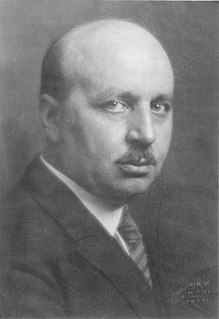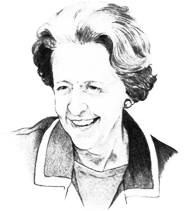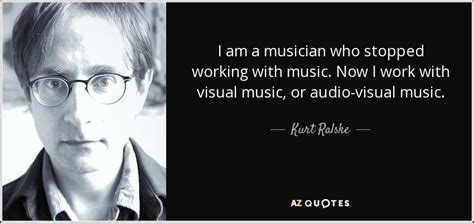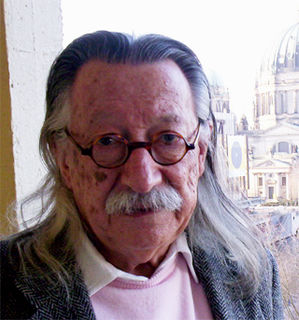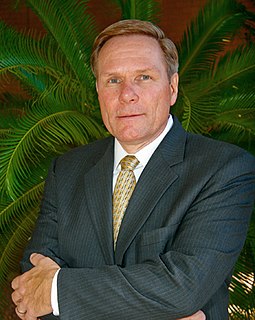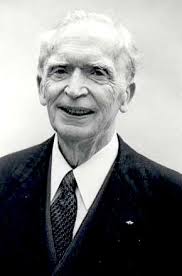Top 1147 Processes Quotes & Sayings - Page 19
Explore popular Processes quotes.
Last updated on November 14, 2024.
The first effect of the mind growing cultivated is that processes once multiple get to be performed in a single act. Lazarus has called this the progressive "condensation" of thought. ... Steps really sink from sight. An advanced thinker sees the relations of his topics is such masses and so instantaneously that when he comes to explain to younger minds it is often hard ... Bowditch, who translated and annotated Laplace's Méchanique Céleste, said that whenever his author prefaced a proposition by the words "it is evident," he knew that many hours of hard study lay before him.
My "degree" has done nothing for me at all. But that I've learned - the critical thought processes I've tried to keep sharp - these things were furthered along by college. I hated so much of my life "at university," but I also loved so much of it, and the things that I loved about it have kept me in a sort of "scholarly pursuit" to this day. Maybe it messed me up because I believe that there are things like truth and beauty, and that art and discussion can help us find them and enhance our lives.
Today's enterprise IT architecture is about integrating systems to meet business needs. Consequently, IT architects can't - and don't - live in a vacuum. To address that reality, Catalyst Conference 2006 will delve into strategic infrastructure technologies with the depth to which our clients have grown accustomed. With the larger number of Cross-Cutting Concerns sessions, we'll also clearly illustrate how these technologies relate to each other, and how roles, geographies, and business processes intersect within an enterprise.
There are two processes which we adopt consciously or unconsciously when we try to prophesy. We can seek a period in the past whose conditions resemble as closely as possible those of our day, and presume that the sequel to that period will, save for some minor alterations, be similar. Secondly, we can survey the general course of development in our immediate past, and endeavor to prolong it into the near future. The first is the method the historian; the second that of the scientist. Only the second is open to us now, and this only in a partial sphere.
The first act by virtue of which the State really constitutes itself the representative of the whole of societythe taking possession of the means of production in the name of societythis is, at the same time, its last independent act as a State. State interference in social relations becomes, in one domain after another, superfluous, and then dies out of itself; the government of persons is replaced by the administration of things, and by the conduct of processes of production. The State is not abolished. It dies out.
Isn't it odd I've made some friends in the Republican Party, but that's in spite of the fact that I cannot agree with not any one single thing they stand for. That's the irony in the joy of being a human being in that we don't resent each other for our different thought processes, but anything that offers the attitude to me of "I'm going to stop you because that offends my religion", then I'm going to stop them. So I have one more note against that ideology, and the idea of a real estate agent running the universe is just not acceptable.
We're missing a lot of the real-life stories of what people's work looks like. Those are the people that I want sitting on the zoning board meetings, on the zoning commissions. Those are the people I want participating in business improvement in their own industry. The gentrification processes that often happen in cities so often manifest in street sweeps of sex workers. How do you get sex workers on neighborhood associations, regarded as members of the neighborhood?
Countries were told they had no incentives because of social ownership. The solution was privatization and profit, profit, profit. Privatization would replace inefficient state ownership, and the profit system plus the huge defense cutbacks would let them take existing resources and an increase in consumption. Worries about distribution and competition or even concerns about democratic processes being undermined by excessive concentration of wealth could be addressed later.
Life is eternal; death only punctuates it for a short while. After a little break life starts again. Death is ultimate truth; life is truth beyond ultimate. Life is never destroyed; it just keeps on changing shapes. Endless processes are attached with this life; many stages are there in this grand journey of life. From an insect to an enlightened soul it keeps on changing. Creation is always beautiful in the beginning. It can be beautiful all the time also. What is purpose of life? It's evolution to higher levels
Ideally a painter (and, generally, an artist) should not become conscious of his insights: without taking the detour through his reflective processes, and incomprehensibly to himself, all his progress should enter so swiftly into the work that he is unable to recognize them in the moment of transition. Alas, the artist who waits in ambush there, watching, detaining them, will find them transformed like the beautiful gold in the fairy tale which cannot remain gold because some small detail was not taken care of.
By the time the child can draw more that scribble, by the age of four or five years, an already well-formed body of conceptual knowledge formulated in language dominates his memory and controls his graphic work. Drawings are graphic accounts of essentially verbal processes. As an essentially verbal education gains control, the child abandons his graphic efforts and relies almost entirely on words. Language has first spoilt drawing and then swallowed it up completely.
Nature prefers the more probable states to the less probable because in nature processes take place in the direction of greater probability. Heat goes from a body at higher temperature to a body at lower temperature because the state of equal temperature distribution is more probable than a state of unequal temperature distribution.
Let us ask... how things work at the level of on-going subjugation, at the level of those continuous and uninterrupted processes which subject our bodies, govern our gestures, dictate our behaviors, etc... we should try to discover how it is that subjects are gradually, progressively, really and materially constituted through a multiplicity of organisms, forces, energies, materials, desires, thoughts, etc. We should try to grasp subjection in its material instance as a constitution of subjects.
When the first mechanical clocks were invented, marking off time in crisp, regular intervals, it must have surprised people to discover that time flowed outside their own mental and physiological processes. Body time flows at its own variable rate, oblivious to the most precise hydrogen master clocks in the laboratory. In fact, the human body contains its own exquisite time-pieces, all with their separate rhythms. There are the alpha waves in the brain; another clock is the heart. And all the while tick the mysterious, ruthless clocks that regulate aging.
Our intellectual powers are rather geared to master static relations and that our powers to visualize processes evolving in time are relatively poorly developed. For that reason we should do (as wise programmers aware of our limitations) our utmost to shorten the conceptual gap between the static program and the dynamic process, to make the correspondence between the program (spread out in text space) and the process (spread out in time) as trivial as possible.
Nature has put itself the problem how to catch in flight light streaming to the earth and to store the most elusive of all powers in rigid form. To achieve this aim, it has covered the crust of earth with organisms which in their life processes absorb the light of the sun and use this power to produce a continuously accumulating chemical difference. ... The plants take in one form of power, light; and produce another power, chemical difference.
In the councils of government, we must guard against the acquisition of unwarranted influence, whether sought or unsought, by the military industrial complex. The potential for the disastrous rise of misplaced power exists and will persist. We must never let the weight of this combination endanger our liberties or democratic processes. We should take nothing for granted. Only an alert and knowledgeable citizenry can compel the proper meshing of the huge industrial and military machinery of defense with our peaceful methods and goals, so that security and liberty may prosper together.
Idealism, though just in its premises, and often daring and honest in their application, is stultified by the exclusive intellectualism of its own methods: by its fatal trust in the squirrel-work of the industrious brain instead of the piercing vision of the desirous heart. It interests man, but does not involve him in its processes: does not catch him up to the new and more real life which it describes. Hence the thing that matters, the living thing, has somehow escaped it; and its observations bear the same relation to reality as the art of the anatomist does to the mystery of birth.
The foolish took their lamps, but took no oil (pursued ministry as their priority over getting oil). The wise took oil in their vessels with their lamps (pursued oil as their priority before ministry). At the dark midnight hour of history, the Spirit will raise up forerunners who cry out that Jesus is coming as a Bridegroom God and that we must go out to meet Him (make the necessary effort to encounter Him). They all slept which speaks of living in context to the natural processes of life.
[To the cultures of Asia and the continent of Africa] it is the Western impact which has stirred up the winds of change and set the processes of modernization in motion. Education brought not only the idea of equality but also another belief which we used to take for granted in the West-the idea of progress, the idea that science and technology can be used to better human conditions. In ancient society, men tended to believe themselves fortunate if tomorrow was not worse than today and anyway, there was little they could do about it.
Many persons who are not conversant with mathematical studies imagine that because the business of [Babbage’s Analytical Engine] is to give its results in numerical notation, the nature of its processes must consequently be arithmetical and numerical, rather than algebraical and analytical. This is an error. The engine can arrange and combine its numerical quantities exactly as if they were letters or any other general symbols; and in fact it might bring out its results in algebraical notation, were provisions made accordingly.
The system is that there is no system. That doesn't mean we don't have process. Apple is a very disciplined company, and we have great processes. But that's not what it's about. Process makes you more efficient ... But innovation comes from people meeting up in the hallways or calling each other at 10:30 at night with a new idea, or because they realized something that shoots holes in how we've been thinking about a problem. It's ad hoc meetings of six people called by someone who thinks he has figured out the coolest new thing ever and who wants to know what other people think of his idea.
Expression is never considered a given, and it is in fact maybe not what's most interesting about making art. Making art, since 1960 or something, is many things: it's a way of doing philosophy, it's a way of opening a dialogue, it's a way of putting a fact or a question out into the world, or a way of drawing people into new relationships, or a way of interrogating history. It's all these other sorts of strategies or techniques or processes that are really interesting and really valuable.
In diabetes mellitus the case is as follows: the ego-organization, as it submerges in the astral and etheric realm, is so weakened that it can no longer effectively accomplish its action upon the sugar-substance. The sugar then undergoes the processes in the astral and etheric realms which should take place in the ego-organization.... From all this we see that a real healing process for diabetes mellitus can only be initiated if we are in a position to strengthen the ego-organization of the patient.
Implementing any major changes to the way companies operate requires time and determination and the shift to globally integrated innovation is no exception - it calls for new capabilities to be built, changes in the structure of the innovation organization, new systems, processes and mindsets. The scope and scale of this task shouldn't prevent executives from starting down the path of change as the systemic nature of innovation activities means that every single element of change that's brought about will make a difference.
Ed Lawler and I document that the key to creating good, productive jobs in all industries is to organize work processes and systems in ways that allow employees to contribute significant amounts of "added value" to the products they make and services they provide. When mangers give employees the organizational structure, resources, and authority needed for them to contribute their ideas and efforts, American workers, like those at Harley-Davidson, almost always prove capable of effectively competing against their overseas counterparts.
If writing novels is like planting a forest, then writing short stories is more like planting a garden. The two processes complement each other, creating a complete landscape that I treasure. The green foliage of the trees casts a pleasant shade over the earth, and the wind rustles the leaves, which are sometimes dyed a brilliant gold. Meanwhile, in the garden, buds appear on the flowers, and colorful petals attract bees and butterflies, reminding us of the subtle transition from one season to the next.
Man is not a machine, ... although man most certainly processes information, he does not necessarily process it in the way computers do. Computers and men are not species of the same genus. .... No other organism, and certainly no computer, can be made to confront genuine human problems in human terms. ... However much intelligence computers may attain, now or in the future, theirs must always be an intelligence alien to genuine human problems and concerns.
The right to the city is far more than the individual liberty to access urban resources: it is a right to change ourselves by changing the city. It is, moreover, a common rather than an individual right since this transformation inevitably depends upon the exercise of a collective power to reshape the processes of urbanization. The freedom to make and remake our cities and ourselves is, I want to argue, one of the most precious yet most neglected of our human rights.
The reason why it is so difficult for existing firms to capitalize on disruptive innovations is that their processes and their business model that make them good at the existing business actually make them bad at competing for the disruption. Companies in fact are specifically organized to under-invest in disruptive innovations! This is one reason why we often suggest that companies set up separate teams or groups to commercialize disruptive innovations. When disruptive innovations have to fight with other innovations for resources, they tend to lose out.
If we understand the mechanisms and motives of the group mind, it is now possible to control and regiment the masses according to our will without their knowing it In almost every act of our daily lives, whether in the sphere of politics or business, in our social conduct or our ethical thinking, we are dominated by the relatively small number of persons who understand the mental processes and social patterns of the masses. It is they who pull the wires which control the public mind.
If we were magically shrunk and put into someone's brain while she was thinking, we would see all the pumps, pistons, gears and levers working away and we would be able to describe the workings completely, in mechanical terms, thereby completely describing the thought processes of the brain. But that description would not contain any mention of thought! It would contain nothing but descriptions of pumps, pistons, levers!
Just as in the body, eye and ear develop as organs of perception, as senses for bodily processes, so does a man develop in himself soul and spiritual organs of perception through which the soul and spiritual worlds are opened to him. For those who do not have such higher senses, these worlds are dark and silent, just as the bodily world is dark and silent for a being without eyes and ears.
A garden is the place millions of people go to touch the earth, to smell flowers - to use some of that fabled human brain power in the cause of better participating with natural processes in the place they call home. It serves as an art project, an organic produce market, a spiritual practice, a pharmacy. It offers ongoing lessons in ecology, biology, chemistry, geology, meteorology. Gardening imparts an organic perspective on the passage of time. It bestows on its practitioners a genuine sense of admiration for the plants, the soil, the sun, the water.
Time Management Tips: The perpetual processing of the same temptation is both dangerous and time-wasting. Cycling and recycling the same temptation (instead of rejecting such blandishment out of hand) is not only to risk one's soul, again and again, but is to bring on fatigue, so that the Adversary may be able to do indirectly what we will not let him do directly. A lack of decisiveness in dealing with temptation ties up our thought processes and prevents us from doing good with the time allotted to us.
In the name of economy a thousand wasteful devices would be invented; and in the name of efficiency new forms of mechanical time-wasting would be devised: both processes gained speed through the nineteenth century and have come close to the limit of extravagant futility in our own time. But labor-saving devices could only achieve their end-that of freeing mankind for higher functions-if the standard of living remained stable. The dogma of increasing wants nullified every real economy and set the community in a collective squirrel-cage.
In the dog two conditions were found to produce pathological disturbances by functional interference, namely, an unusually acute clashing of the excitatory and inhibitory processes, and the influence of strong and extraordinary stimuli. In man precisely similar conditions constitute the usual causes of nervous and psychic disturbances. Different conditions productive of extreme excitation, such as intense grief or bitter insults, often lead, when the natural reactions are inhibited by the necessary restraint, to profound and prolonged loss of balance in nervous and psychic activity.
Chemistry has the same quickening and suggestive influence upon the algebraist as a visit to the Royal Academy, or the old masters may be supposed to have on a Browning or a Tennyson. Indeed it seems to me that an exact homology exists between painting and poetry on the one hand and modem chemistry and modem algebra on the other. In poetry and algebra we have the pure idea elaborated and expressed through the vehicle of language, in painting and chemistry the idea enveloped in matter, depending in part on manual processes and the resources of art for its due manifestation.
If a therapist is feeling insecure in therapy, a lot of therapists will try to sort of push that aside to try to do the therapy. Instead, we would ask people to get with that feeling of insecurity, because after all, the client is being asked to do the same thing. It has a kind of a quality of two human beings in the same situation, really, working through these psychological processes. And yeah, you hired me; I'm working for you as a therapist. But I'm not up here and you're down there. And what you're struggling with, at other times and with other areas I'm struggling with.
EMACS could not have been reached by a process of careful design, because such processes arrive only at goals which are visible at the outset, and whose desirability is established on the bottom line at the outset. Neither I nor anyone else visualized an extensible editor until I had made one, nor appreciated its value until he had experienced it. EMACS exists because I felt free to make individually useful small improvements on a path whose end was not in sight.
There's one uneasy borderline between what is external and what is internal, and this borderline is defined exactly by the sense organs and the skin and the introduction of external things within my own body. Consciousness is altered by physical events and physical objects, which impinge upon my sense organs, or which I introduce into my body. Now the name traditionally given to external objects or processes which change you internally is sacrament. Sacraments are the visible and tangible techniques for bringing you close to your own divinity.
Dhyan means meditation. Meditation means awareness, watchfulness, a silent witnessing of all the processes of the mind. And the magic of watching is that as your watchfulness deepens, the mind starts evaporating. When the watchfulness is absolute mind becomes nil, a zero. And the disappearance of the mind gives you clarity, absolute clarity, transparency; you can see through and through, you become a mirror. And then life is reflected as it is - not according to any doctrine, not according to the Bible or the Koran or the Gita but as it is. And to know life as it is, is to know god.
The main thesis of mind-physics holds that consciousness and matter are both manifestations of a more primary entity, and that the processes of manifestation exhibit equivalent invariances for both consciousness and matter. When the program for mind-physics is complete the subject-object dichotomy of modal logic, the polarity of concept-percept, and the antagonism between morality and technology will all come to an end. Then the non-repeatable experiment will be understood to be more primary than the traditional repeatable experiment.
Virtually every company will be going out and empowering their workers with a certain set of tools, and the big difference in how much value is received from that will be how much the company steps back and really thinks through their business processes, thinking through how their business can change, how their project management, their customer feedback, their planning cycles can be quite different than they ever were before.
Although humans today remain more capable than machines for many tasks, by 2030 machine capabilities will have increased to the point that humans will have become the weakest component in a wide array of systems and processes. Humans and machines will need to become far more closely coupled, through improved human-machine interfaces and by direct augmentation of human performance
Our too-young and too-new America, lusty because it is lonely, aggressive because it is afraid, insists upon seeing the world in terms of good and bad, the holy and the evil, the high and the low, the white and the black; our America is frightened of fact, of history, of processes, of necessity. It hugs the easy way of damning those whom it cannot understand, of excluding those who look different, and it salves its conscience with a self-draped cloak of righteousness
Suppose that the organism is given the problem of determining the analysis of a stimulus at a certain level of representation - e.g., the problem of determining which sequence of words a given utterance encodes. Since, in the general case, transducer outputs underdetermine perceptual analyses, we can think of the solution of such problems as involving processes of nondemonstrative inference. In particular, we can think of each input system as a computational mechanism which projects and confirms a certain class of hyputheses on the basis of a certain body of data.
What specialists try to do is get at least three imaging processes that are totally different from each other. Then you can run these through a computer program and make a composite image. In one scenario you suspect a brain tumor, so you image the brain tumor with PET scans, MRIs, and CT scans and create a 3D model. The doctor opens up the skull to excise the cancer, but they can't see anything. Do you cut out what's supposed to be in that spot or not? The current story is yes, you believe the images over what you see with your eyes.
Contrary to any claim of a systematically “neutral” effect of taxation on production, the consequence of any such shortening of roundabout methods of production is a lower output produced. The price that invariably must be paid for taxation, and for every increase in taxation, is a coercively lowered productivity that in turn reduces the standard of living in terms of valuable assets provided for future consumption. Every act of taxation necessarily exerts a push away from more highly capitalized, more productive production processes in the direction of a hand-to-mouth-existence.
...methods are more important than facts. The educational value of a problem given to a student depends mostly on how often the thought processes that are invoked to solve it will be helpful in later situations. It has little to do with how useful the answer to the problem may be. On the other hand, a good problem must also motivate the students; they should be interested in seeing the answer. Since students differ so greatly, I cannot expect everyone to like the problems that please me.
The difference between magic and meditation methods is the difference between drugs and diet—medicines will do swiftly what diet can only effect slowly, and in critical cases there is no time to wait for the slow processes of dietetics, so it must be either medicines or nothing. Nevertheless, drugs are no substitute for right diet and wholesome regime, and although magic enables a speedy and potent result to be attained, is is only by means of right understanding and right ethics that the position which has been won can be held.
What is the point of abusing yourself with guilt in the first place? If you did make a mistake and act in a hurtful way, your guilt won't reverse your blunder in some magical manner. It won't speed your learning processes so as to reduce the chance you'll make the same mistake in the future. Other people won't love and respect you more because you are feeling guilty and putting yourself down in this manner. Nor will your guilt lead to productive living. So what's the point?
There is, perhaps, one universal truth about all forms of human cognition: the ability to deal with knowledge is hugely exceeded by the potential knowledge contained in man's environment. To cope with this diversity, man's perception, his memory, and his thought processes early become governed by strategies for protecting his limited capacities from the confusion of overloading. We tend to perceive things schematically, for example, rather than in detail, or we represent a class of diverse things by some sort of averaged "typical instance.
I can only express the hope that faith in the judicial system will never be diminished, and I am sure it will not, so long as we allow a review of the judicial processes that takes place here in some other tribunal where obviously undue influence cannot be brought to bear. As long as governments are wise enough to leave alone the rights of appeal to some superior body outside Singapore, then there must be a higher degree of confidence in the integrity of our judicial process. This is most important.
Quantum theory thus reveals a basic oneness of the universe. It shows that we cannot decompose the world into independently existing smallest units. As we penetrate into matter, nature does not show us any isolated "building blocks," but rather appears as a complicated web of relations between the various parts of the whole. These relations always include the observer in an essential way. The human observer constitute the final link in the chain of observational processes, and the properties of any atomic object can be understood only in terms of the object's interaction with the observer.
Of Cooking. This is an art of various forms, the object of which is to give ordinary observations the appearance and character of those of the highest degree of accuracy. One of its numerous processes is to make multitudes of observations, and out of these to select only those which agree, or very nearly agree. If a hundred observations are made, the cook must be very unhappy if he cannot pick out fifteen or twenty which will do for serving up.
There are three reasons, . . . apart from scientific considerations, mankind needs to travel in space. The first . . . is garbage disposal; we need to transfer industrial processes into space so that the earth may remain a green and pleasant place for our grandchildren to live in. The second . . . to escape material impoverishment: the resources of this planet are finite, and we shall not forego forever the abundance of solar energy and minerals and living space that are spread out all around us. The third . . . our spiritual need for an open frontier.
Your history's not going to go away; it isn't the same thing as dirt on the floor or paint peeling off the walls; it's not going to be solved in that way. It's more like learning how to carry it, to contact it, to see it. Because it's based on the psychology of the normal, the therapist is part of that too. And so they too are working with those very same processes. And so it requires a therapist just to see the value of it and to be willing to look at their own difficult emotions and thoughts and find a way to carry them gently in the service of the clients that they're serving.
The first thing to remember is the dual nature of your mind. The subconscious mind is constantly amenable to the power of suggestion; furthermore the subconscious mind has complete control of the functions, conditions, and sensations of your body. Trust the subconscious mind to heal you. It made your body, and it knows all of its processes and functions. It knows much more than your conscious mind about healing and restoring you to perfect balance.
Taken as a whole, the Chinese revolutionary movement led by the Communist Party embraces the two stages, i.e., the democratic and the socialist revolutions, which are two essentially different revolutionary processes, and the second process can be carried through only after the first has been completed. The democratic revolution is the necessary preparation for the socialist revolution, and the socialist revolution is the inevitable sequel to the democratic revolution. The ultimate aim for which all communists strive is to bring about a socialist and communist society.










